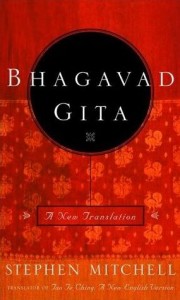(Complete contents at
Gita in a Nutshell: Big Ideas and Best Quotations.
For notice of each weekly blog,
please join our Facebook group.)
It’s a great revelation to read the Gita by major theme instead of in the order it’s written. Today let’s talk about the first major theme:
LIVE AND ACT WITH LOVE AND PURPOSE,
DETACHING EGO FROM RESULTS
The Gita contains many powerful passages on this theme, but they are scattered throughout the text. When you read them all together, as below, the main ideas jump off the page with crystalline clarity.
Read though these stanzas slowly and thoughtfully, jotting down your reactions as you go. Share your comments and questions, and we’ll get some conversation going:
Self-possessed, resolute, act
without any thought of results,
open to success or failure.
This is equanimity is yoga. (BG 2.48)
The wise man lets go of all
results, whether good or bad,
and is focused on the action alone.
Yoga is skill in actions. (BG 2.50)
The superior man is he
whose mind can control his senses;
with no attachment to results,
he engages in the yoga of action. (BG 3.7)
Without concern for results,
perform the necessary action;
surrendering all attachments,
accomplish life’s highest good. (BG 3.19)
Though the unwise cling to their actions,
watching for results, the wise
are free of attachments, and act
for the well-being of the whole world. (BG 3.25)
Performing all actions for my sake,
desireless, absorbed in the Self,
indifferent to “I” and “mine”,
let go of your grief, and fight! (BG 3.30)
~
He who can see inaction
in the midst of action, and action
in the midst of inaction, is wise
and can act in the spirit of yoga.
With no desire for success,
no anxiety about failure,
indifferent to results, he burns up
his actions in the fire of wisdom.
Surrendering all thoughts of outcome,
unperturbed, self-reliant,
he does nothing at all, even
when fully engaged in actions.
There is nothing he expects,
nothing that he fears. Serene,
free from possessions, untainted,
acting with the body alone.
content with whatever happens,
unattached to pleasure or pain,
success or failure, he acts
and is never bound by his action.
When a man has let go of attachments,
when his mind is rooted in wisdom,
everything he does is worship
and his actions all melt away.
God is the offering, God
is the offered, poured out by God;
God is attained by all those
who see God in every action. (BG 4.18-24)
~
The man of yoga who is able
to overcome, here on earth,
the turmoil of desire and anger—
that man is truly happy.
He who finds peace and joy
and radiance within himself,
that man becomes one with God
and vanishes into God’s bliss. (BG 5.23-25)
~
He who performs his duty
with no concern for results
is the true man of yoga—not
he who refrains from action.
Know that right action itself
is renunciation, Arjuna;
in the yoga of action, you first
renounce your own selfish will.
For the man who wishes to mature,
the yoga of action is the path;
for the man already mature,
serenity is the path.
When a man has become unattached
to sense-objects or to actions,
renouncing his own selfish will,
then he is mature in yoga. (BG 6.1-4)
~
…when a man is released
from dualities, he can act
purely, without attachment,
and can serve me with all his heart. (BG 7.28)
He who acts for my sake,
loving me, free of attachment,
with benevolence toward all beings,
will come to me in the end. (BG 11.55)
~
He who has let go of hatred,
who treats all beings with kindness
and compassion, who is always serene,
unmoved by pain and pleasure,
free of the “I” and “mine,”
self-controlled, firm and patient,
his whole mind focused on me—
that man is the one I love the best. (BG 12.13-14)
~
Free of the “I” and “mine,”
from aggression, arrogance, greed,
desire, and anger, he is fit
for the state of absolute freedom. (BG 18.53)
Next:
#2: Experience Infinite Wonder in All Things(Complete contents at
Gita in a Nutshell: Big Ideas and Best Quotations.
For notice of each weekly blog,
please join our Facebook group.)

 Share on bsky
Share on bsky







Read 80 comments and reply